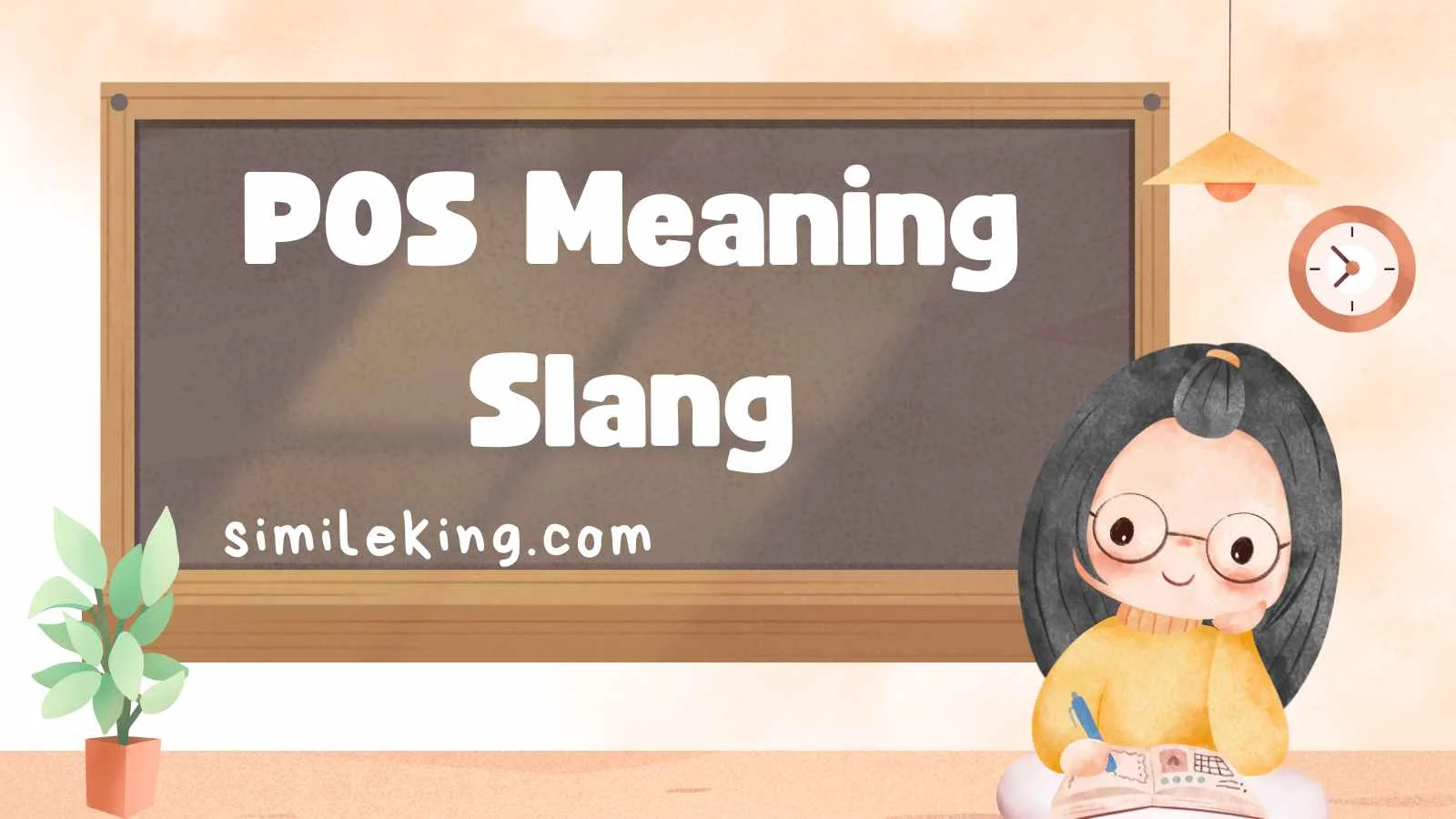Language evolves faster today than at any other time in history. Every year, new abbreviations, acronyms, and shorthand expressions emerge across social media, texting, and online communities. One abbreviation that often confuses people—especially those new to digital culture—is POS.
In everyday communication, “POS” can have multiple meanings depending on the context, audience, and tone. Understanding its usage is essential if you want to avoid misunderstandings, maintain professionalism when required, and still connect casually with friends when the setting is relaxed.
This article explores what POS means in slang, its various interpretations, when to use it, when to avoid it, and polite or professional alternatives. By the end, you’ll be able to use the phrase effectively in conversations—whether texting a friend, chatting in a group, or responding in a professional environment.
What Does POS Mean in Slang?
The most common slang definition of POS is “Parent Over Shoulder.”
This abbreviation gained popularity in the early days of instant messaging (AIM, MSN Messenger, and early texting) and remains in use today on WhatsApp, Snapchat, and even Discord. It’s a quick way for someone—usually a teenager or young adult—to signal that they cannot type freely because a parent (or someone authoritative) is nearby.
Example:
- Friend 1: “What happened at the party last night?”
- Friend 2: “Can’t talk rn, POS.”
Here, POS means “I can’t speak freely because my parent is watching.”
Other Common Meanings of POS in Text
While “Parent Over Shoulder” is the primary slang definition, POS has several other meanings depending on the situation. Some are casual, some professional, and some context-specific:
- Point of Sale – A professional/business usage, referring to the place or system where transactions occur.
- Piece of Software – Used in tech conversations.
- Point of Service – Healthcare and insurance industries use this.
- Positive – Informal short form in medical or test results context.
- Part of Speech – Used in linguistics, grammar, and education.
- Parent Over Shoulder – The most common slang meaning.
Notice how the interpretation changes entirely based on setting. That’s why understanding tone and audience is crucial before using or interpreting POS.
Why Context Matters in Slang
Unlike formal language, slang is fluid. It adapts to cultural trends, peer groups, and even generational differences. Using POS with the wrong audience can lead to embarrassment or misunderstanding.
- Among friends (casual tone): POS usually signals someone nearby is monitoring.
- In business (professional tone): POS refers to “Point of Sale” systems or retail software.
- In academic/technical settings: POS can stand for “Part of Speech.”
Pro Tip (2025 Update): Because Gen Z and Gen Alpha are digital-native generations, abbreviations like POS are used less often in favor of emojis, disappearing messages, or voice notes. However, POS is still recognized as a classic internet slang abbreviation.
Polite, Professional, and Casual Alternatives to POS
Since “POS” can sound confusing—or even negative (it can also be taken as an insult in some contexts)—it’s wise to choose tone-appropriate alternatives.
Here are ways to say “POS” without using the abbreviation:
1. Parent is nearby
- Best for casual chats.
- Example: “Can’t chat openly, my parent is in the room.”
2. Someone’s watching me
- Neutral and casual.
- Example: “Hold on, someone’s over my shoulder right now.”
3. I can’t type freely
- A polite way of expressing restriction.
- Example: “I’ll explain later, can’t type freely right now.”
4. Under supervision
- Professional and polite.
- Example: “I’m under supervision at the moment, can’t discuss details.”
5. Parent in the room
- Direct but casual.
- Example: “Parent in the room, let’s talk later.”
6. Being monitored
- Polite and professional alternative.
- Example: “I’m being monitored, let’s continue this later.”
7. Eyes on me
- Casual and fun phrasing.
- Example: “Can’t spill details now, got eyes on me.”
8. Conversation not private
- Professional tone, especially in sensitive contexts.
- Example: “This chat isn’t private, let’s continue later.”
9. Someone might read this
- Neutral and cautionary.
- Example: “Better not text details here, someone might read this.”
10. I’ll explain later
- The safest, universally acceptable option.
- Example: “I’ll explain later, not a good time right now.”
How to Choose the Right Alternative
When choosing how to express the meaning of POS, consider three factors:
- Audience – Are you talking to a close friend, a coworker, or someone older?
- Use casual alternatives with friends.
- Use professional wording with colleagues or clients.
- Tone – Do you want to sound serious, playful, or neutral?
- “Parent in the room” = playful/casual.
- “Conversation not private” = professional.
- Medium – Are you texting, emailing, or speaking in person?
- Texting → casual shorthand works.
- Emails → stick to professional phrasing.
10 Polished Examples of POS (and Alternatives) in Text
Here are 10 clear texting examples that show POS in action with better alternatives:
- “POS, can’t talk rn. 🚫📱”
- “Parent in the room, I’ll message later.”
- “Someone’s watching me 👀, brb.”
- “Not private right now, let’s talk later.”
- “Can’t type freely, I’ll explain soon.”
- “Eyes on me, gotta keep it low-key.”
- “Being monitored, not safe to share.”
- “This chat isn’t private, let’s move to DM.”
- “Parent nearby, I’ll ping you when free.”
- “POS… but not the retail kind 😂.”
Why Understanding Slang Like POS Matters in 2025
Slang terms like POS are not just shortcuts—they reflect digital culture, privacy concerns, and generational identity. In 2025:
- Privacy signals like POS remain relevant because people still need discreet communication.
- Professional crossover of terms is increasing (POS in retail vs. POS in texting).
- Generational understanding builds stronger connections—knowing slang helps parents, teachers, and professionals relate to younger audiences.
By learning the full range of meanings and alternatives, you can avoid misunderstandings, show respect for context, and communicate more effectively across settings.
Final Thoughts
The slang term POS is a versatile abbreviation with multiple meanings: from “Parent Over Shoulder” in casual texting to “Point of Sale” in business. Understanding when and how to use it can save you from awkward situations and ensure you’re always understood correctly.
When in doubt, use clear alternatives that fit your audience and situation. Whether you’re keeping things casual with a friend or staying professional at work, knowing how to adapt your language is a skill that never goes out of style.





